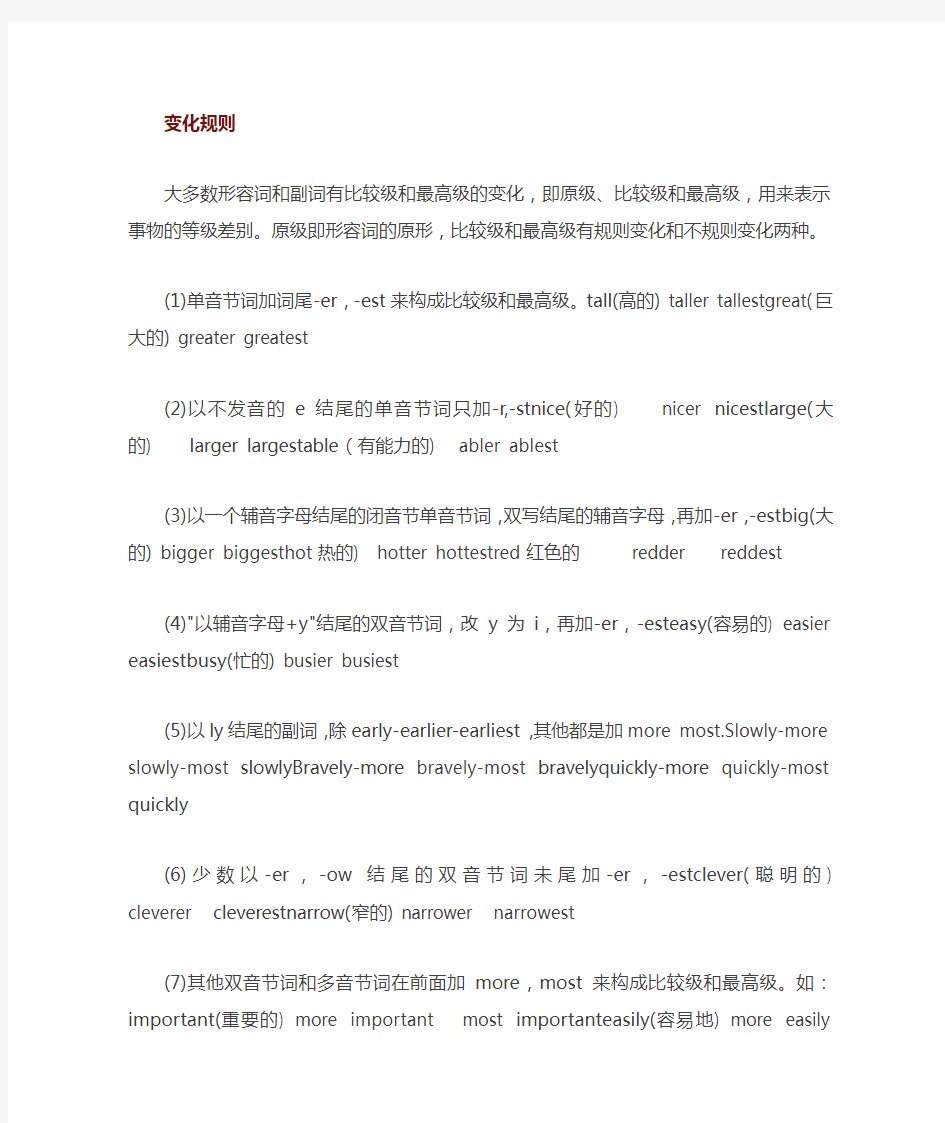形容词的比较级和最高级知识点汇总

- 1、下载文档前请自行甄别文档内容的完整性,平台不提供额外的编辑、内容补充、找答案等附加服务。
- 2、"仅部分预览"的文档,不可在线预览部分如存在完整性等问题,可反馈申请退款(可完整预览的文档不适用该条件!)。
- 3、如文档侵犯您的权益,请联系客服反馈,我们会尽快为您处理(人工客服工作时间:9:00-18:30)。
变化规则
大多数形容词和副词有比较级和最高级的变化,即原级、比较级和最高级,用来表示事物的等级差别。原级即形容词的原形,比较级和最高级有规则变化和不规则变化两种。
(1)单音节词加词尾-er,-est来构成比较级和最高级。tall(高的) taller tallestgreat(巨大的) greater greatest
(2)以不发音的e结尾的单音节词只加-r,-stnice(好的) nicer nicestlarge(大的) larger largestable (有能力的) abler ablest
(3)以一个辅音字母结尾的闭音节单音节词,双写结尾的辅音字母,再加-er,-estbig(大的) bigger biggesthot热的) hotter hottestred红色的 redder reddest
(4)"以辅音字母+y"结尾的双音节词,改y为i,再加-er,-esteasy(容易的) easier easiestbusy(忙的) busier busiest
(5)以ly结尾的副词,除early-earlier-earliest,其他都是加more most.Slowly-more slowly-most slowlyBravely-more bravely-most bravelyquickly-more quickly-most quickly
(6)少数以-er,-ow结尾的双音节词未尾加-er,-estclever(聪明的) cleverer cleverestnarrow(窄的) narrower narrowest
(7)其他双音节词和多音节词在前面加more,most来构成比较级和最高级。如:important(重要的) more important most
importanteasily(容易地) more easily most easily
(8)一些词的比较级和最高级,可以加-er或 -est,也可以加more 或most如:clever, polite等。
(9) 不规则变化有一些词的比较级、最高级变化是不规则的,需要特殊记忆。如:good / well→better→bestbad / ill/badly→worse→worstmany / much→more→mostlittle→less→leastfar→farther→farthest(
表示距离) / far→further→furthest (表示程度)old→older / elder→oldest (表示新旧或年龄) / eldest (表示兄弟姐妹之间的长幼关系)
副词的比较级和最高级的构成规则和形容词比较级和最高级的构成规则一样,所不同的是:形容词最高级前面必须用the,而副词的最高级前面的the可带可不带。
一些词本身没有比较级和最高级形式,如:right, wrong, full, empty, round, complete, wooden, dead, daily等。long-longer-longestyoung-younger-youngestold-older/elder-ol dest/eldestshort-shorter-shortesthigh-higher-highestdeep-de eper-deepestsmall-smaller-smallestbig-bigger-biggesttall-ta ller-tallestloud-louder-loudestlow-lower-lowestthin-thinner -thinnestfat-fatter-fattestgreat-greater-greatestnice-nicer -nicesthappy-happier-happiestheavy-heavier-heaviestcheap-ch eaper-cheapestnear-nearer-nearestclean-cleaner-cleanestfew-
fewer-fewestlate-later-latestangry-angrier-angriestbusy-bus ier-busiestlazy-lazier-laziesthot-hotter-hottestglad-gladde r-gladdestclear-clearer-cleareststrong-stronger-strongestlu cky-luckier-luckiestinteresting-moreinteresting-most interestingdifficult-more difficult-most difficultexpensive-more expensive-most expensive
2
形容词比较级的用法
1. 两者比较时用形容词比较级,其结构为“... 比较级+ than ...”。如:Actions speak louder than words.
2. 在两者之间选择“哪一个更……”时,用句型“Which / Who is +比较级, ... or ...?”。如:Which sweater is cheaper, the red one or the yellow one?
3. 表示“两者之间最……的一个”时,用“the + 比较级”。如:Lucy is the taller of the twins.
4. 表示“越……,越……”时,用“the + 比较级,the + 比较级”。如:The more you eat, the fatter you will become.
5. 表示“越来越……”时,用“比较级 + and + 比较级”,多音节词和部分双音节词用“more and more + 形容词原级”。如:We should make our country more and more beautiful.
6. 形容词比较级前可以用下列词修饰:much, a little, far, a bit,
a few, a lot, even, still, rather等。如:It's much colder today
